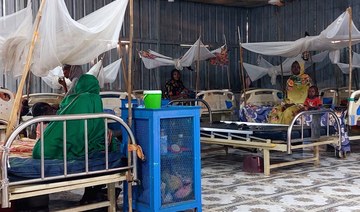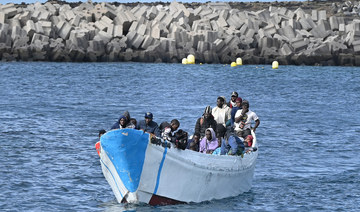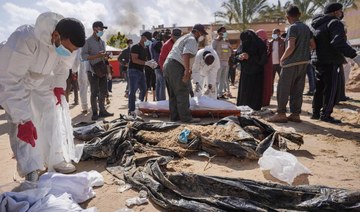DAMASCUS: A shadow of her former self after years of war, 11-year-old Arabian mare Karen stands quietly as a Syrian vet gently pushes a syringe into her pale grey neck.
“Karen used to be the beauty queen of all horses,” says the vet, Ahmad Sharida.
But inside her stable near Damascus today, her hips jut out viciously from her overgrown speckled coat.
Weak and withdrawn, Karen is unable to even whinny.
After almost eight years of war, she is one of dozens of Arabian horses from all over Syria recovering from the physical and psychological trauma of the fighting.
Prized for their beauty, endurance and speed, Arabian purebreds are one of the oldest horse breeds in the world.
In Syria, Bedouins have bred them in the north of the country for centuries, seeking to maintain the purity of the local bloodlines.
Before the conflict, Sharida had proudly watched Karen grow from a long-legged foal into a graceful equine beauty.
“I know her very well. I was the one who brought her out of her mother’s belly,” says the vet, a stethoscope hanging around his neck.
But he lost sight of Karen after she was stolen from her stable in Eastern Ghouta in 2012, the same year rebels overran the region northeast of Damascus.
The area suffered five years of regime bombardment, as well as food and medicine shortages under a crippling siege, before Russia-backed government forces took it back last year.
Sharida had long fled his home region but returned to search for missing Arabian horses and immediately recognized Karen when he found her in October.
“I was so shocked,” says the 51-year-old vet.
“She was all skin and bones, and could barely stand up.”
Like all other horses he found, she was frail and sick after years of being surrounded by fighting, not enough food, and no medical attention.
Syria’s war has killed more than 360,000 people and displaced millions since it started in 2011 with the brutal repression of anti-government protests.
And it has taken a toll on the country’s equine population too.
“Horses have greatly suffered, just like us all,” says Mohammed Ghaith Al-Shaib, head of the state’s Arabian Horse Office.
“They’ve also been displaced, kidnapped and killed.”
Of the 8,500 horses that Syria registered with the World Arabian Horse Organization (WAHO) in 2011, it has lost 3,000 in the war, he says.
But the conflict in Syria has turned around in recent years, and after a series of victories against rebels and jihadists, President Bashar Assad’s regime is now in control of almost two-thirds of the country.
Having returned to one region after another, the Damascus authorities are now trying to protect the country’s Arabian purebreds.
Since 2014, WAHO has recognized 2,400 new Syrian foals as Arabian, after samples from their manes were sent off for DNA testing in Germany, Shaib says.
Horses rescued from retaken areas are being looked after at a state-run stables west of the capital, Damascus.
At the stables in Dimas, staff are paying special attention to Karen’s recovery.
She hails from the Hadbaa strain of Arabian purebreds, so called after their long eyelashes and mane.
But after years of war, she is the only known female survivor of a rare Syrian branch of that family.
“The Hadbaa Enzahi Fawaeira were already at risk of dying out before the war,” says Shaib.
But “today, it’s only Karen.”
Arabian mares are often seen as more precious than their male counterparts, as they carry the bloodline from one generation to the next.
Once Karen has regained her health, her carers hope to artificially inseminate her so that she can give birth to a daughter.
To maintain her bloodline, a Syrian purebred should father that female foal — but he does not need to come from the same strain.
Karen is just one of many Arabian horses all over Syria recovering from conflict.
In the adjacent hippodrome, trainer Jihad Ghazal watches a student trot around the red-earth arena on a horse with a shiny brown coat.
Nejm — “star” in Arabic — spent the war in Damascus, a city which has remained relatively sheltered from the conflict.
But the mare was one of the luckier ones, says Ghazal, who is full of anecdotes about the suffering of her kind.
“Horses are very sensitive, and the sounds they hear greatly affect them,” says the 40 year-old, wearing jeans and trainers.
During the war, an alleged Israeli strike hit Dimas, traumatising pregnant mares, for example.
“For a year afterwards, foals were born paralyzed or dead because their mother had been so terrified,” he says.
In 2016, a horse was so shocked by a blast that, within hours, he had killed himself.
“He banged his head against metal until he died.”
War horses: Syria’s Arabian beauties plod way to recovery
War horses: Syria’s Arabian beauties plod way to recovery
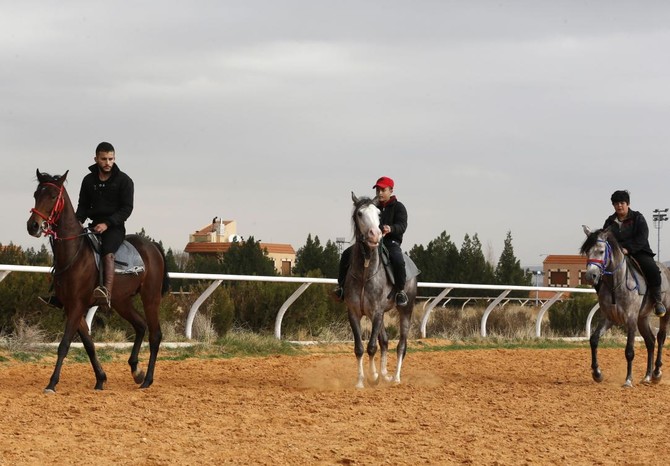
- After almost eight years of war, Karen is one of dozens of Arabian horses from all over Syria recovering from the physical and psychological trauma of the fighting
Israeli attack on Iran would change ‘circumstances’, Iran’s president says
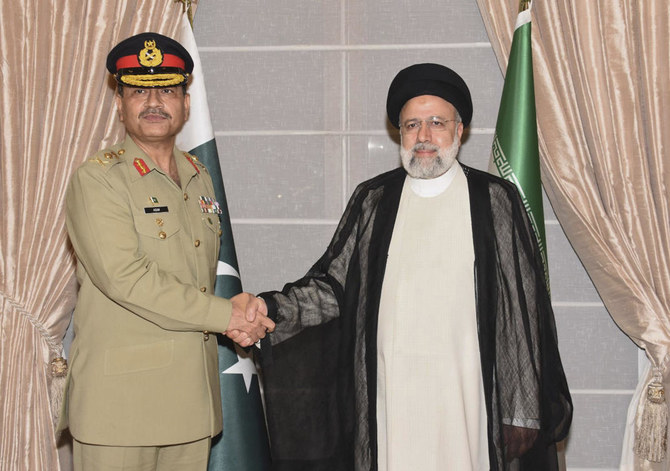
DUBAI: An Israeli attack on Iranian territory would bring about a complete change of “circumstances,” Iran’s President Ebrahim Raisi was quoted as saying on Tuesday by the official IRNA news agency.
Raisi, who is visiting Pakistan, was quoted as saying such an attack could possibly result in there be nothing left of the “Zionist regime.”
Truce crumbles in Sudanese army’s last Darfur holdout
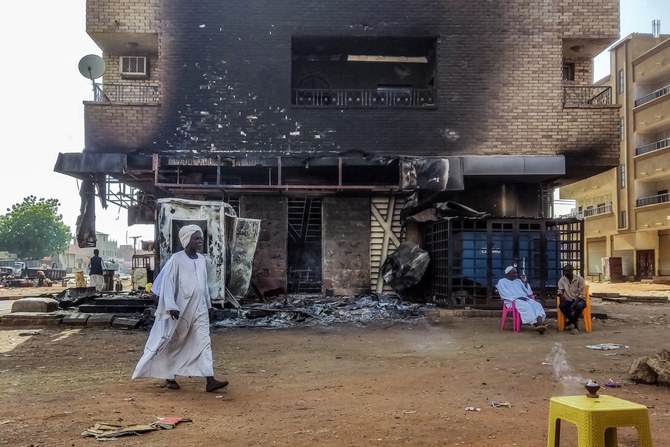
- Al-Fashir is the last major city in the vast, western Darfur region not under control of the paramilitary Rapid Support Forces (RSF)
- Witnesses say the army has reinforced supplies and troops, including through an air drop to its base in the city
CAIRO/DUBAI: Attacks around the Sudanese city of Al-Fashir have shattered a truce that protected it from a year-old war, leading to warnings of a new wave of inter-communal violence and humanitarian risks for 1.6 million residents crammed into the North Darfur capital.
Al-Fashir is the last major city in the vast, western Darfur region not under control of the paramilitary Rapid Support Forces (RSF). The RSF and its allies swept through four other Darfur state capitals last year, and were blamed for a campaign of ethnically driven killings against non-Arab groups and other abuses in West Darfur.
The fight for Al-Fashir, a historic center of power, could be more protracted, inflame ethnic tensions that surfaced in the early-2000s conflict in the region and reach across Sudan’s border with Chad, say residents, aid agencies and analysts.
Al-Fashir’s population includes an estimated half a million people displaced during that earlier conflict, when the army, assisted by Arab militias that evolved into the RSF, put down a rebellion by non-Arab rebel groups.
About half a million more people moved into the city during the war that broke out between the army and the RSF in the capital Khartoum in April 2023, as long-simmering tensions over integrating the two forces came to a head.
As the war spread to other parts of the country, local leaders brokered a truce in Al-Fashir, with the RSF confined to eastern areas of the city while the former rebel groups stayed neutral.
But the arrangement fell apart after the RSF took the town of Melit this month, effectively blockading Al-Fashir.
Witnesses say the army has reinforced supplies and troops, including through an air drop to its base in the city, unlike in other state capitals where soldiers quickly fled.
Two prominent former rebel groups, Minni Minawi’s Sudan Liberation Army (SLA) and Jibril Ibrahim’s Justice and Equality Movement, said they would also defend against the RSF.
Many non-Arabs in Al-Fashir are gripped with fear.
“We don’t know what to do,” 39-year-old resident Mohamed Gasim told Reuters by phone. “Al-Fashir is dangerous, but leaving is more dangerous.”
VILLAGES RAZED
Even before the truce collapsed, occasional skirmishes killed more than 220 people in Al-Fashir in the last year, according to Ismail Khareef, an activist in Abu Shouk, one of the displacement camps that dot the city.
Clashes on April 16 left at least 18 dead, Khareef said. Gunfire and projectiles, including from army warplanes, have fallen on homes, he and other residents say.
Since the start of the month, at least 11 villages on Al-Fashir’s outskirts have been razed, according to satellite imagery obtained by the Yale Humanitarian Research Lab. At least 36,000 have been displaced, the United Nations estimates.
Local activists and an SLA spokesperson blamed the RSF and allied militias, who have been known to use arson in past attacks, including in West Darfur. The activists said that survivors of the attacks reported around 10 people killed and that the attackers used ethnic insults.
The RSF denied attacking Al-Fashir and said it was careful to keep clashes away from civilians in the city, accusing the army and allied groups of attacking it on the outskirts. The RSF has previously denied responsibility for ethnic violence in Darfur.
The army did not immediately respond to requests for comment.
Al-Fashir itself has not had functioning running water or power lines for a year, said Awadalla Hamid, Darfur director for Practical Action, speaking to Reuters from the city, where few international humanitarians remain. Only one public hospital is functioning, while displaced people are crammed into schools and public buildings, he said.
Jerome Tubiana, an expert on Darfur and adviser to medical charity MSF, said all-out fighting “risks already complicating further humanitarian access, at a time where available data shows Al-Fashir is suffering of an extremely serious food crisis.”
SPILLOVER RISK
Since the war began, only small quantities of aid have entered Al-Fashir, the only army-approved conduit for shipments to other parts of Darfur. Residents say that though markets are functioning, the RSF’s control of the main road has caused prices for fuel, water and other goods to soar.
Recent tensions and violence around Al-Fashir have also raised concerns about a wider spillover.
The former rebel groups fighting alongside the army hail from the Zaghawa tribe, which reaches across the border into Chad, counting Chadian leader Mahamat Idriss Deby as a member.
Arab and non-Arab tribes like the Zaghawa have long clashed over land and valuable resources in Darfur, analysts say.
Complicating matters is the entrance of the forces belonging to Musa Hilal, a leading Arab commander from the early 2000s and rival of RSF commander Mohamed Hamdan Dagalo, known as Hemedti, despite hailing from the same tribe. A spokesperson confirmed a video of Hilal addressing forces in North Darfur on Monday, but said that it was too soon to say if the forces would join the fight in Al-Fashir or elsewhere.
“Even if there was a ceasefire between SAF and RSF this is way beyond them. There are scores being settled and tensions being renewed,” said Jonas Horner, an independent Sudan analyst.
Tunisian coast guard retrieves bodies of 19 migrants
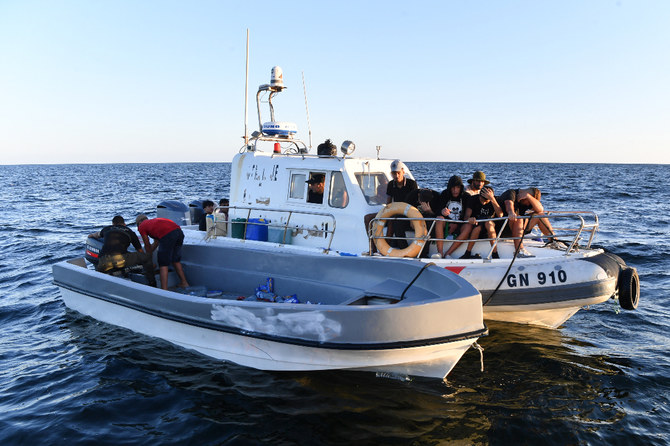
TUNIS, April 23 : The Tunisian coast guard has retrieved the bodies of 19 migrants who were trying to reach the Italian island of Lampedusa, the national guard said on Tuesday.
The latest incident took the number of migrant deaths off the Tunisian coast to nearly 200 in first four months of this year.
Israeli military rejects allegations of burying Palestinians in mass graves at Gaza hospital
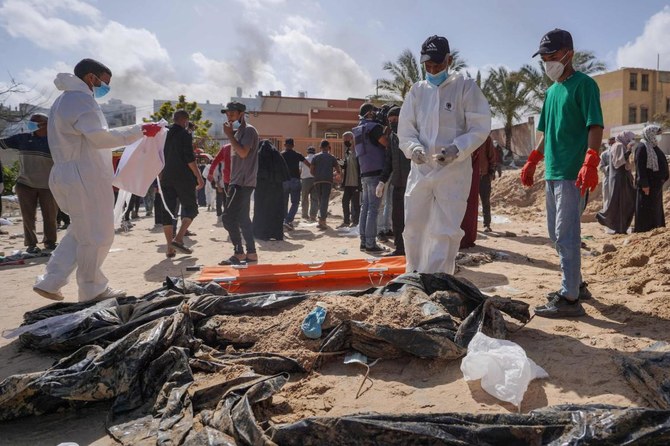
- The military said corpses already buried at Nasser hospital were examined as part of search for hostages
- UN calls for international probe into deaths at Gaza hospitals
GENEVA: Israeli military on Tuesday rejected allegations that its forces buried Palestinians in mass graves at a Gaza hospital, after the United Nations called for international investigation into the deaths during Israeli sieges, saying war crimes may have been committed.
In a statement, the military said corpses already buried at Nasser hospital were examined as part of search for hostages.
The UN rights office said it was “horrified” by the destruction of Gaza’s biggest hospital, Al-Shifa in Gaza City, and its second largest, the Nasser Medical Complex in Khan Yunis.
It called for an international investigation into reports of mass graves at the two Gaza hospitals destroyed in Israeli sieges.
On Monday, the Palestinian territory’s Civil Defense agency said health workers had uncovered more than 200 bodies of people killed and buried at Nasser hospital, which was besieged by Israeli troops last month.
In early April the World Health Organization said Al-Shifa had been destroyed by an Israeli siege, leaving an “empty shell” containing many bodies.
The UN rights office on Tuesday demanded “independent, effective and transparent investigations into the deaths.”
“Given the prevailing climate of impunity, this should include international investigators,” UN rights chief Volker Turk said in a statement.
Hospitals, which are protected under international law, have repeatedly come under Israeli bombardment over more than six months of war in Gaza.
Israel has accused Palestinian militant group Hamas of using Gazan medical facilities as command centers and to hold hostages abducted during its attack inside Israel on October 7.
Hamas has denied those claims.
International law violations
“Hospitals are entitled to very special protection under international humanitarian law,” Turk pointed out.
“And the intentional killing of civilians, detainees and others who are hors de combat is a war crime.”
The UN rights office said it did not have access to independent information as to what had transpired at the two hospitals.
But spokeswoman Ravina Shamdasani said efforts were under way to corroborate reports and details given by Gaza authorities.
The latter say 283 bodies were recovered from Nasser hospital, including 42 that had been identified.
“Victims had reportedly been buried deep in the ground and covered with waste,” she told reporters in Geneva.
Older people, women and wounded were reportedly among the dead, she said.
Others were allegedly “found with their hands tied and stripped of their clothes.”
As for Al-Shifa, the Israeli army has said around 200 Palestinians were killed during its military operation at the hospital
Shamdasani pointed to reports indicating that this toll “may be an underestimate.”
Around 30 bodies were reported found buried in two graves in the courtyard of Al-Shifa hospital.
“And there are reports that the hands of some of these bodies were also tied,” Shamdasani said.
So far, she said, the UN “can’t corroborate the exact figures” of people killed at the two hospitals, underlining: “This is why we are stressing the need for international investigations.”
“Clearly there have been multiple bodies discovered,” she said.
The reports that some had their hands tied indicated “serious violations” of international law, she added.
“These need to be subjected to further investigation... They can’t just be more reports in this horrific war that just pass under the radar.”
Qatar Foreign Ministry: No justification to end Hamas’ presence in Doha
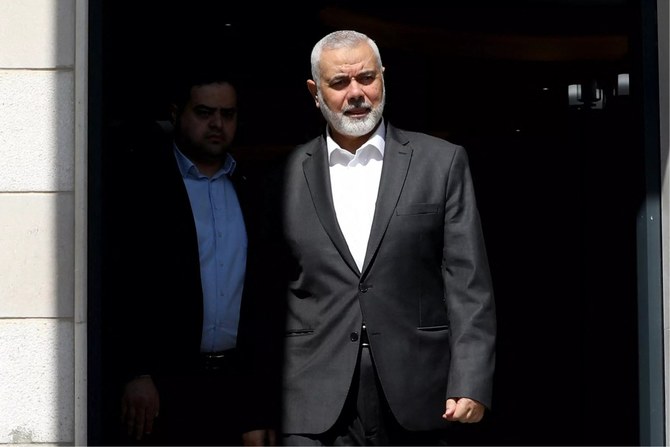
- Qatar said it was re-evaluating its role as mediator in ceasefire talks between Israel and the Palestinian group Hamas
DUBAI: Qatar said on Tuesday there was no justification to end the presence of an office for Palestinian militant group Hamas in Doha while its mediation efforts continued in the Gaza war.
Foreign Ministry spokesperson Majed Al-Ansari added in a press conference that Qatar remained committed to mediation but was reassessing its role in "frustration with attacks" on its efforts.
Last week, Qatar said it was re-evaluating its role as mediator in ceasefire talks between Israel and the Palestinian group Hamas, citing concerns that its efforts are being undermined by politicians seeking to score points.
Qatari Prime Minister Sheikh Mohammed bin Abdulrahman Al-Thani, who is also foreign minister, said there was a "misuse of this mediation for narrow political interests, and this necessitated Qatar to undertake a full evaluation of this role".







